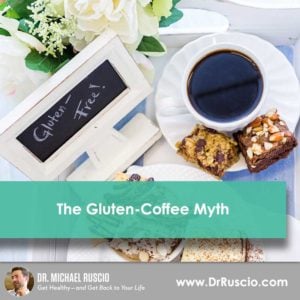The Gluten-Coffee Myth

- Get help with gluten sensitivity and coffee.
- Get my free gut health eBook.
- Healthcare providers looking to sharpen their clinical skills, check out the Future of Functional Medicine Review Clinical Newsletter.
The Gluten-Coffee Myth
This week we’ve been talking about gluten a bunch. I want to address a misleading study that’s been going around regarding gluten sensitivity and potential cross-reactivity with coffee.
There have been articles swirling around the internet claiming coffee isn’t good for gluten sensitive people or those with celiac disease because it can sometimes contain gluten or create a cross-reactive reaction.
First, there are two claims being made here – it’s important to differentiate between the two:
- That coffee can contain gluten and therefore those with gluten sensitivity or celiac disease should avoid coffee.
- There’s a cross-reactivity reaction in gluten sensitive people with coffee.
Through careful research, I’ve concluded that both these claims are based on the same study and have been extrapolated beyond their findings. I also think that because coffee causes digestion issues with so many people, it’s pretty easy to believe any issues it gives you could be related to your gluten sensitivity.
Anyone with gluten sensitivity will tell you they are no stranger to digestive struggles.
So, before you’re quick to sacrifice your beloved cup o’ joe, let’s examine what these two claims suggest and why I think they’re myths.
Does coffee contain gluten?
Standard coffee beans after normal processing do not contain gluten.
This means if you are drinking brewed coffee, there isn’t a real risk for you to experience any gluten-related reactions. Here I’m referring to the kind of coffee that is brewed in a coffee maker and is not instant coffee.
Instant coffee is mixed in hot water and has been found to contain trace amounts of gluten. This gluten is a contamination that occurs during processing and isn’t due to the coffee itself.
In this study, the coffee that caused the adverse reactions contained gluten because it was contaminated instant coffee – not ground coffee beans.
Instant coffee has all sorts of additives to make it foam and have the texture of coffee. I do not recommend drinking instant coffee.
Keep in mind, many people have adverse reactions to drinking coffee due to the caffeine and other compounds. However, the adverse reactions due to coffee have nothing to do with gluten (unless you’re drinking contaminated instant coffee).
Does coffee cross-react with gluten?
The other argument out there is that it’s possible coffee can cross-react with gluten. Cross-reactivity refers to the process when your body mistakes certain food items for something they are not. For example, the idea that your body could mistake coffee for gluten is the basis of many of these claims.
The claim is that coffee triggers a gluten response in gluten sensitive people. I’ve looked through the available studies and found that these arguments seem to be based on the same study mentioned above, which referred to gluten-contaminated instant coffee.
In fact, when pure coffee was assessed there was no reaction, meaning those with gluten sensitivity should be just fine.
Coffee isn’t great for everyone
Keep in mind, coffee isn’t great for everyone, but you can’t blame this on gluten. Coffee isn’t a great idea for people with the following conditions:
- Fatigue
- Anxiety
- Irritable bowel syndrome
- Insomnia
…Or if it makes you feel bad in general.
Don’t feel like you need to avoid coffee if you’re gluten sensitive or have celiac disease. As with many of my other recommendations, stay away from the processed stuff. This study is a perfect example of how you never quite know what you’re getting when you consume overly processed products.
I hope this sheds some light on a myth that’s gaining some traction. I’ll continue to be on the lookout for future studies on this subject.
I enjoy bringing you the most up-to-date research and scientifically accurate analysis so you can get healthy, and get back to your life.
What do you think? I would like to hear your thoughts or experience with this.
- Get help with gluten sensitivity and coffee.
- Get my free gut health eBook.
- Healthcare providers looking to sharpen their clinical skills, check out the Future of Functional Medicine Review Clinical Newsletter.
Dr. Ruscio is your leading functional and integrative doctor specializing in gut related disorders such as SIBO, leaky gut, Celiac, IBS and in thyroid disorders such as hypothyroid and hyperthyroid. For more information on how to become a patient, please contact our office. Serving the San Francisco bay area and distance patients via phone and Skype.
Discussion
I care about answering your questions and sharing my knowledge with you. Leave a comment or connect with me on social media asking any health question you may have and I just might incorporate it into our next listener questions podcast episode just for you!